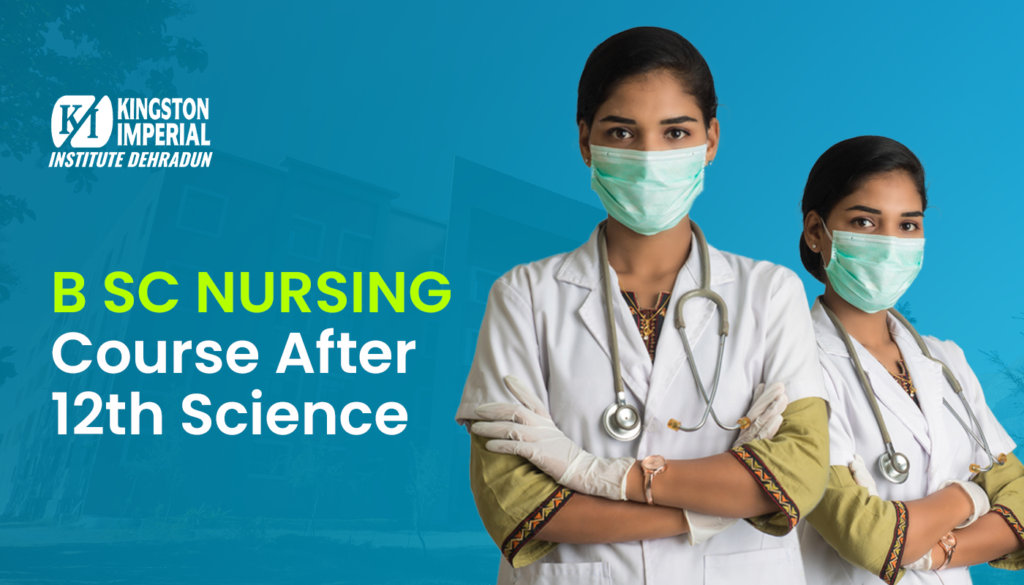
The field of healthcare is one of the most rewarding and respected career paths, offering immense opportunities to make a meaningful difference in people’s lives. The Kingston Imperial Institute of Medical Sciences (KIIMS) in Dehradun is a premier institution offering top-notch education and training in healthcare fields, including the B.Sc. Nursing program.
Among the many career options in this domain, pursuing a Bachelor of Science in Nursing (B.Sc. Nursing) after completing 12th grade with a science background stands out as a popular and promising choice.
This blog will explore everything you need to know about the B.Sc. Nursing course, its benefits, eligibility criteria, curriculum, career prospects, and why it is a worthwhile investment for aspiring healthcare professionals.
Why Choose BSc Nursing?
Nursing is more than just a profession; it is a vocation that combines compassion, clinical expertise, and dedication to patient care. B.Sc. Nursing is a four-year undergraduate program designed to equip students with the theoretical knowledge and practical skills necessary for delivering high-quality healthcare. Here are some reasons why this course is an excellent choice:
High Demand for Nurses
The global healthcare industry faces a significant shortage of qualified nurses. This demand ensures job security and opens doors to international opportunities.
Diverse Career Paths
A B.Sc. Nursing degree offers diverse career options, including clinical practice, research, administration, and teaching.
Job Satisfaction
Nurses play a critical role in patient recovery, providing both medical assistance and emotional support. This aspect of the job brings immense satisfaction and fulfillment.
Gateway to Advanced Studies
B.Sc. Nursing graduates can pursue higher education, such as M.Sc. Nursing, specialized certifications, or even managerial roles in healthcare.
Eligibility Criteria for BSc Nursing
To enroll in a B.Sc. Nursing program, candidates must meet certain academic and personal qualifications. While specific requirements may vary by institution, the general criteria are as follows:
Educational Background
Completion of 10+2 with a science stream (Physics, Chemistry, and Biology) is mandatory.
A minimum aggregate score of 45-50% in the 12th board exams is typically required.
Age Limit
Candidates must be at least 17 years old at the time of admission.
Some institutions have an upper age limit, usually around 35 years.
Entrance Exams
Many universities and colleges conduct entrance exams for admission into B.Sc. Nursing programs. Common entrance tests include NEET, AIIMS Nursing Entrance, and state-level exams.
Health Requirements
Since nursing involves direct patient care, candidates must be physically and mentally fit.
Curriculum Overview
The B.Sc. Nursing program spans four years and is divided into theoretical classes, practical sessions, and clinical training. The curriculum is designed to provide a strong foundation in medical sciences and nursing practice. Here’s a breakdown of the subjects and areas covered:
Year 1: Fundamentals of Nursing
- Anatomy and Physiology
- Biochemistry
- Nutrition and Dietetics
- Nursing Foundations
- Psychology
Year 2: Intermediate Nursing Knowledge
- Medical-Surgical Nursing
- Pathology and Genetics
- Microbiology
- Pharmacology
- Sociology
Year 3: Specialized Nursing Skills
- Child Health Nursing
- Mental Health Nursing
- Community Health Nursing
- Research and Statistics
Year 4: Advanced Concepts and Training
- Midwifery and Obstetric Nursing
- Management of Nursing Services
- Research Project
- Internship and Clinical Training
Career Opportunities After B.Sc. Nursing
The scope of a nursing career is vast and extends beyond hospitals and clinics. Graduates of the B.Sc. Nursing program can explore a variety of roles, such as:
- Staff Nurse
Work in hospitals, clinics, or community health centers providing direct patient care. - Nurse Educator
Teach and train aspiring nursing students in academic institutions. - Public Health Nurse
Contribute to community healthcare by working in government or NGO-led public health initiatives. - Specialized Nurse
Pursue additional certifications to specialize in areas like pediatric nursing, critical care, or oncology. - Researcher
Participate in medical research projects to improve healthcare practices and policies. - Administrative Roles
Take on managerial positions in healthcare facilities, overseeing nursing staff and operations. - International Opportunities
With the growing demand for nurses globally, graduates can work in countries like the USA, Canada, Australia, and the Middle East.
Skills Required for a Successful Nursing Career
To excel in the nursing profession, candidates should develop the following skills:
- Empathy and Compassion
A nurse must provide emotional support to patients and their families. - Attention to Detail
Precision is crucial when administering treatments or maintaining patient records. - Communication Skills
Effective communication with doctors, patients, and colleagues is essential. - Problem-Solving Ability
Nurses often face critical situations that require quick and effective decision-making. - Physical Stamina
Long hours and demanding shifts require good physical and mental endurance.
Top Colleges Offering B.Sc. Nursing in India
India boasts several prestigious institutions that offer B.Sc. Nursing programs. Some of them include:
- All India Institute of Medical Sciences (AIIMS)
- Christian Medical College (CMC), Vellore
- Armed Forces Medical College (AFMC), Pune
- Postgraduate Institute of Medical Education and Research (PGIMER), Chandigarh
- Rajkumari Amrit Kaur College of Nursing, Delhi
Future Prospects and Higher Studies
After completing B.Sc. Nursing, candidates can enhance their qualifications through:
- M.Sc. Nursing
Specialize in fields like cardiology, neonatology, or psychiatric nursing. - Postgraduate Diplomas
Explore certifications in hospital administration, public health, or critical care nursing. - Doctoral Studies
Pursue a Ph.D. in Nursing for a career in academics or advanced research.
Conclusion
Choosing B.Sc. Nursing after 12th science is a decision that combines personal growth with professional stability.
The course not only prepares students to excel in the healthcare industry but also instills a sense of responsibility and empathy. With the growing demand for qualified nurses worldwide, this program is an excellent choice for those passionate about healthcare and patient welfare.
Whether you dream of working in a hospital, engaging in community healthcare, or pursuing advanced studies, B.Sc. Nursing lays a strong foundation for a fulfilling and impactful career.
If you’re ready to embark on a journey of lifelong learning and service, B.Sc. Nursing is the path for you. Take the first step today and contribute to a healthier tomorrow!

